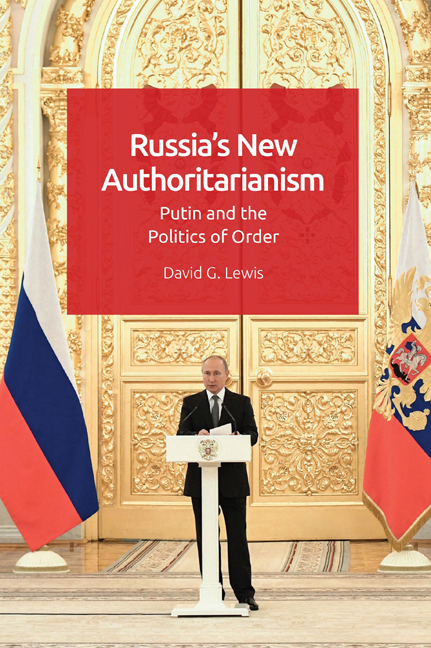Book contents
- Frontmatter
- Contents
- Preface
- Acknowledgements
- Note on Transliteration and Translation
- One Authoritarianism, Ideology and Order
- Two Carl Schmitt and Russian Conservatism
- Three Sovereignty and the Exception
- Four Democracy and the People
- Five Defining the Enemy
- Six Dualism, Exceptionality and the Rule of Law
- Seven The Crimean Exception
- Eight Großraum Thinking in Russian Foreign Policy
- Nine Apocalypse Delayed: Katechontic Thinking in Late Putinist Russia
- Conclusion
- Bibliography
- Index
Three - Sovereignty and the Exception
- Frontmatter
- Contents
- Preface
- Acknowledgements
- Note on Transliteration and Translation
- One Authoritarianism, Ideology and Order
- Two Carl Schmitt and Russian Conservatism
- Three Sovereignty and the Exception
- Four Democracy and the People
- Five Defining the Enemy
- Six Dualism, Exceptionality and the Rule of Law
- Seven The Crimean Exception
- Eight Großraum Thinking in Russian Foreign Policy
- Nine Apocalypse Delayed: Katechontic Thinking in Late Putinist Russia
- Conclusion
- Bibliography
- Index
Summary
What is the meaning of state sovereignty … ? It is above all a question of freedom, freedom of choice for every person, every people, every state [to decide] their own fate.
Vladimir Putin (2015a)The Centrality of Sovereignty
When Vladimir Putin won a presidential election in March 2004 with 71.4 per cent of the vote, he appeared to be entering his second term in office at the height of his political power. Putin had succeeded in turning the tide in the Chechen war, reasserted control over Russia's regions, tamed the media and parliament, and suppressed or co-opted powerful oligarchs. But by early 2005 the Kremlin ‘felt like a besieged fortress’, wrote Mikhail Zygar, and ‘panic was beginning to set in’ (Zygar 2016: 102). There was domestic unrest, as large protests erupted in Russian cities over pensioners’ benefits. Neighbouring countries were rocked by ‘colour revolutions’ – popular protests that overthrew corrupt or authoritarian regimes. A ‘Rose’ revolution in November 2003 in Georgia was followed by an ‘Orange’ revolution in Ukraine in December 2004, and a ‘Tulip’ revolution in Kyrgyzstan in April 2005. Looking ahead to the next presidential elections in 2008, Vladislav Surkov worried about a possible ‘colour revolution’ in Russia itself. ‘In 2008 we will either preserve our sovereignty or be ruled externally’, Vladislav Surkov announced dramatically to a party meeting in Krasnoyarsk in November 2005 (Zygar 2016: 113).
The struggle to preserve and enhance Russia's sovereignty became the defining trope of Putin's second term in office, and a central pillar of the entire Putinist system. It was accompanied by an important debate about the meaning of sovereignty in the twenty-first century that owed much to the work of Carl Schmitt and his followers. Conventional accounts of sovereignty agreed that it is a contested concept with multiple meanings. A standard work by Krasner highlights four key meanings. International legal sovereignty refers to the formal recognition of states in the international system, while Westphalian sovereignty represents the ‘exclusion of external actors … from the territory of a state’. Domestic sovereignty refers to the ‘ability of public authorities to exercise effective control within the borders of their own polity’. In the era of globalisation, ‘interdependence sovereignty’ references ‘the ability of public authorities to regulate the flow of information, ideas, goods, people, pollutants or capital across the borders of their state’ (Krasner 1999: 3–4).
- Type
- Chapter
- Information
- Russia's New AuthoritarianismPutin and the Politics of Order, pp. 49 - 80Publisher: Edinburgh University PressPrint publication year: 2020



